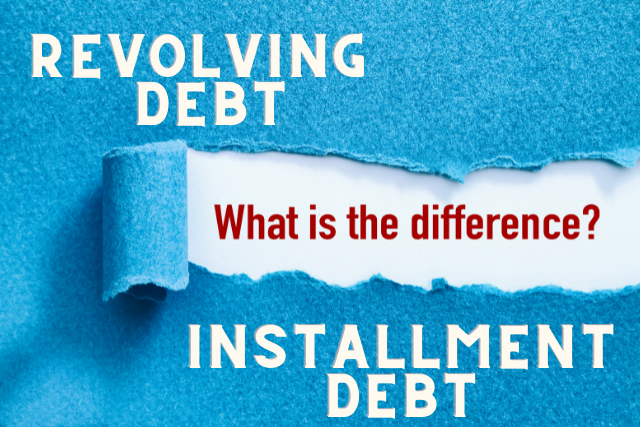Installment And Revolving Debt Affect Scores Differently

If you’ve ever researched methods of improving your credit scores you undoubtedly found hundreds or thousands of articles with tidbits of advice. Ubiquitous to almost all credit improvement articles is advise on keeping your credit card debt as low as possible, perhaps by paying it in full each month. One thing that’s almost always missing is advice about installment debt. That leads to the question, how do installment and revolving debt affect scores differently?
What is revolving and installment debt?
Revolving debt allows consumers to draw against a preset line or limit repeatedly as long as the account remains open and in good standing. Once the borrower pays their balance down or off, they are able to re-draw against the line. Perhaps the most common example of revolving debt is the credit card. With credit cards, the borrower can pay back all or some of the balance and carry some portion of the balance into the next statement cycle. This is commonly referred to as “revolving a balance.”
Installment debt differs because the borrower is approved for and takes advantage of the full loan amount at one time. The payback of an installment loan is broken up into fixed payments over a fixed period of time. There are many examples of installment loans but two of the more common are auto loans and mortgages, where the borrower makes the same payment every month for years. Once the loan has been paid in full, the borrower then officially owns either their car or house.
Both installment loans and revolving accounts are commonly furnished to the credit reporting agencies by lenders. And yes, they are treated differently by credit scoring systems. But, the answer to the “why” question isn’t as simple as you may think.
The knee-jerk response to the “why” question is: revolving credit and installment credit are different, hence the difference in treatment. This response is 100% accurate, and also 100% insufficient. The real reason why the two account types are treated differently deserves a better answer.
First things first, revolving debt is much more influential on credit scores than installment debt. In fact, you can have six or seven figures of installment debt and still have elite-level credit scores that hit 800+ repeatedly. You can’t say the same about revolving debt.
In fact, you can have a few thousand dollars of revolving debt and have lower scores than your peers who have massive amounts of installment debt. This is where we’ll find out the answer to the “why” question.
What’s more predictive of elevated risk?
Everything on a credit report that is considered by credit scoring systems is predictive of elevated credit risk, to some extent. If it wasn’t, then scoring models would ignore it. The ECOA (Equal Credit Opportunity Act) requires scoring models used in the United States to be empirically derived and demonstrably sound. In English, this means models have to be built using accepted statistical methods and you have to be able to prove that they work.
Because of this high bar set by the ECOA, scoring models only consider information that is valuable to the task of predicting whether or not someone is going to miss payments in the future. Considering extraneous and non-predictive information is a waste of time and could lead to degradation of the effectiveness of a scoring system, so it doesn’t happen.
This is the answer to the “why” question. Revolving debt is more predictive of elevated credit risk than installment debt. That’s why having a lot of credit cards with balances or a large amount of credit card debt will cause you to have lower scores than having modest or large amounts of installment debt.
You can fill in the blanks as you please as to the plain-English explanation. Credit card debt isn’t typically secured, while large installment loans typically are secured. People don’t want to lose their cars or homes, so if they have to default they’d rather default on their credit card accounts. The cost to carry credit card debt is several times higher than the cost of carrying installment debt. Some installment debts have tax advantages, while credit card debt does not.
These are all accurate statements and plausible explanations as to why installment debt is less of a problem than revolving debt. But, the real answer to every single one of the “why does X lower my credit scores” questions is “Because it’s predictive of elevated risk.”


